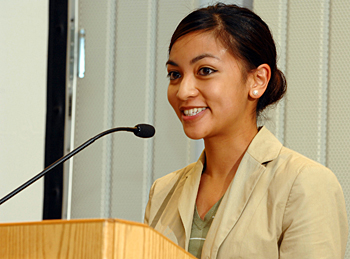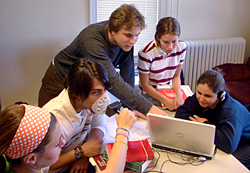
A research project ignited Tom Apple's passion for chemistry when he was a student at the University of Delaware years ago. Apple, dean of UD's College of Arts and Sciences, wants today's UD students to have similar opportunities to be “transformed.”
“By the time our students are ready to graduate, it's important that they be passionate about something, whether in research or community service,” Apple said.
Apple sought funding from the Unidel Foundation for UD's first-ever “Transformation Grants,” aimed at catalyzing “life-changing,” educational experiences for students. The grants were awarded last year to 17 projects in a broad range of disciplines.
On May 3, the faculty and students involved in the grants set the Trabant University Center ablaze with heartfelt testimonials and exciting, new approaches to research and teaching as they shared the results of their projects--from documenting little-known languages to establishing UD's new Computing Museum.
Melissa Ianetta, director of UD's Writing Center, introduced the center's peer tutoring project and then handed the podium off to her students to share their experiences.
“Engineering and English don't mix? Not true!” Aivi Nguyen, a junior at UD, noted emphatically. Nguyen described how her work as a peer tutor correlated to civil engineering, requiring the “building of bridges” between teachers and learners on many levels.
Nguyen said she became a student herself during peer tutoring sessions, learning how to break the ice, constructively critique her fellow students' writing and refrain from dominating the tutorials.
“I walked into the session as a tutor and out as a student,” she said of the learning experience.
In a project led by James Dean, professor of English, undergraduate research is being done “as it has never been done before,” following a model used by researchers in the sciences.
Dean's students are intensively studying Chaucer and developing a glossary of legal terms based on the English author's writings, covering such topics as covenants and the law, and women and the law.
“We've formed teams to bring undergraduates into our research lives--they've become our apprentices,” Dean noted.
Eventually, Dean said, he expects his students to publish research papers like they do in the sciences, with multiple authors.

In January 2007, graduate student Tim McKinnon traveled to the Indonesian island of Sumatra to record the grammar and sound system of several Malay dialects.
“Once I arrived in Jambi Province, I drove for over six hours and then rode on a motorcycle for an hour through the jungle to get to the village,” McKinnon said.
When McKinnon returned to UD, he and Husni Abu Bakar, a Fulbright-funded Malaysian graduate student, assisted Cole in designing a novel undergraduate course to simulate this graduate research experience on the UD campus, including immersing students in the culture of Muslim Southeast Asia.
Lori Pollock, professor of computing and information sciences, reported on a project led by her colleague Paul Amer, UD Alumni Distinguished Professor, to establish UD's new Computing Museum in the foyer of Smith Hall.
Pollock said Amer went around campus in a van, picking up old computers and computer parts--“what most people would consider 'leftover junk,'” she said smiling. “But the fact is a lot of that junk can help demonstrate the incredible advances that have been made in computing technology.”
The project involved students and faculty in anthropology, art conservation, art history, computer science, fine arts and visual communications and museum studies.
“It's surprising how many departments and how many students and faculty came together to accomplish this,” Pollock noted. “It demonstrates the real power of interdisciplinary work.”
Richard Phifer, a senior double-majoring in geography and Italian studies, said he definitely wants to teach some day as a result of his experience producing a radio program in Italian. The program, written and recorded by advanced-level students, is podcast to first-year students.
The project was led by Gabriella Finizio, assistant professor, Tom McCone, director of the Foreign Language Media Center, and Rae Stabosz, computer information technology associate, all in the Department of Foreign Languages and Literatures.
“This experience was really great for me,” Phifer said. “Our program is designed to help first-year students learn Italian, so I felt our efforts were very worthwhile from that standpoint. It also made me realize how challenging it can be to do these kind of programs--sometimes it might take seven or eight takes to do the recording perfectly, and it helped me improve my own language skills in the process.”
Article by Tracey Bryant


